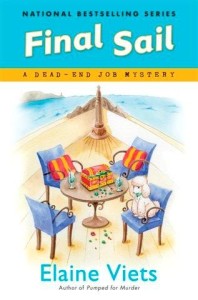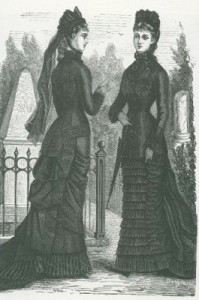By Elaine Viets
My condo looked like someone had a frat party in the living room. I’d barely said hello to my husband in a week. But I finished “Final Sail,” my Dead-End Job novel, on time.
Newly married private eyes Helen Hawthorne and Phil Sagemont investigate two cases undercover. Helen works as a stewardess on a 143-foot yacht to find an emerald smuggler. Phil signs on as estate manager for a trophy wife, Blossom, after her 80-something husband, Arthur Zerling, died suddenly. Arthur’s daughter is sure her father was murdered.
When I turned in “Final Sail,” I knew I’d written the perfect book. All I had to do was wait for the editorial letter to confirm it.
In the novel business, the editorial letter is the in-depth evaluation of your work. You only get one if your editor cares about your work.
Two weeks later, the letter arrived. “As usual you’ve written another fun, witty installment in the Dead-End Job series,” my editor wrote.
Yep, I thought. I’m a pro.
“Even though Helen and Phil have started their own agency, they’re still getting involved in plenty of dead-end jobs. Who would have known stewardesses go through so much on those yachts? Makes me want to cruise myself one day (but certainly not as ‘the help!’).
“Of course, as one of your first readers, I do have a few thoughts/suggestions on revision.”
Uh-oh. I had a sinking feeling.
“As always, take what I say with a grain of salt,” she wrote. “If it doesn’t resonate with you, don’t feel compelled to use it.”
That’s New Yorkese for “fix it.”
I was hit with a boatload of improvements:
Clarify the cause of rich old Arthur Zerling’s death.
Find a better motive for the trophy wife, Blossom, to kill her young lover.
Explain why Blossom killed her old husband in the first place.
Could I also intermingle the two cases? Oh, and that couple on the yacht – the fat, cigar smoking gambler and his blond wife – tone them down and “redefine” their relationship.
Wait! One more thing. Could I “strengthen the end of the book.” Switch the sections so it ends on a happy note?
“So now it’s just a little more revising,” my editor wrote. “I think your readers are so going to enjoy this book!”
She’s served me a love sandwich – two warm, tasty chunks of praise wrapped around really tough meat.
I had two weeks to tear up my perfect book and revise it.
I knew most editors don’t give novels in-depth criticism. I knew I was lucky mine cared.
So how did I react?
Like someone who’s just heard she has a fatal disease. You know Elisabeth Kubler-Ross’s five stages of grief? I went through them all: denial, anger, bargaining, depression, and acceptance.
First, denial. There’s nothing wrong with this book, I told myself. It’s good. No, great. My editor is ruining it. I won’t do it. So there.
I wasted a whole day in denial, before I switched to anger. Now I was furious. What does my editor know? She lives in New York. She doesn’t even know any real people. She hasn’t been to Florida in years. I live here.
Next came depression. I reread her note and realized how much work I was looking at.
After two days of this war raging in my head, I reached acceptance.
Maybe she’s right after all. Better to have her criticize my novel than let the reviewers rip it.
I now had twelve days to rewrite “Final Sail.” The more I worked on the rewrite, the more I saw my editor was right.
I finished the rewrite on deadline.
And the New York Times reviewed it.
“One way for a fugitive to hide in plain sight is to work at low-wage jobs,” Marilyn Stasio wrote, “which is what Helen Hawthorne has been doing in Elaine Viets’ quick-witted mysteries.”
Thanks to my editor, I have this terrific Times quote for the jacket cover. That turned out to be a delicious love sandwich.








Welcome to TKZ, Elaine!
I worked with a terrific editor once who was known for his letters (they were almost the stuff of legend), long and detailed, and though right on, it was always daunting to see what needed fixing. I would get the letter and place it on the corner of my desk, and walk around it for a couple of days before opening it. I knew it was going to mean some jarring revelations and a lot of work, but it always made the books better.
I’ve tried your approach, but since I know I’m going to waste time getting angry and sulking, I’ve learned to dive right in and let the fuming begin.
Welcome to TKZ, Elaine. Great to have you here. Congrats on finishing your latest and showing us all a lesson in accepting criticism. It’s so hard when you’ve spent a year working on your “baby” only to have the editor find fault, even in a loving way. Best of luck with FINAL SAIL.
Thanks, Joe. Nobody likes to hear that their baby is ugly.
Glad to be part of TKZ.
Editors are usually right. We might not like what they say, but their suggestions do make our books stronger. Nowadays my letters come via email, accompanied by a manuscript marked all over by Track Changes. Once I accidentally “Accepted” all changes when I was nearly 3/4 through, meaning my editor wouldn’t see the fixes I’d made. I had to start all over. Be careful what button you push!
Editors are usually right, Nancy. And their success depends on ours. It just takes me awhile to find my own “accept” button.
A link to the book on Amazon would be nice (or is that against blog etiquette?) because the Times review has me psyched to read a few pages. I’ll go and look it up anyway, but it never hurts to make things easy on us casual surfers…:)
Judith
Try this link, Judith, and thanks for visiting!
Final Sail
Thanks for asking for a link, Judith, and for providing it, Kathryn.
Final Sail is available at all find bookstores –and if it’s not, make a BIG scene.
Welcome to TKZ, Elaine! Your story is a great reminder that we all need to handle criticism from time to time, and benefit by doing so. Can’t wait to check out FINAL SAIL!
I get lots of criticism, Kathryn. I just need to appreciate the informed criticism.
This was wonderful! I look forward to reading your column.
Maybe you could describe your revision process more in depth later? I may or may not be hip deep in grueling revision right now…
I’ll be happy to talk more about revising down the line, once the pain wears off.
LMAO, I read this and couldn’t stop smiling. What a great explaination and very understandable view on everything we go through with the edit process. It is pretty interesting how we always end right back at “acceptance” of those changes, isn’t it?
Thanks for the entertaining post!
DC Stone
http://www.authordcstone.com
Earlier in my career, I balked at those changes — and then had to endure reviewers pointing those saves as flaws. I’ve working my way through the school of hard knocks.
Great post, Elaine. So happy that you’re here at TKZ! Congratulations on your latest.
Thanks. I like it here.
Welcome to TKZ Elaine! I have bitten that particular love sandwich before (my agent usually serves it first:)) and my initial reaction is always total ego deflation (ssss….) when I realize he’s right. Then I’m thankful I have someone who gives such great editorial input…then I go away and cry when I think of all the revision ahead of me.
Yep, you’ve been there, Clare.
Great to see you on TKZ, Elaine. I go through the five stages when I meet with my writers group. Sometime I can reach acceptance that night, sometimes it takes a couple of days. Okay, once in a great while I think they’re wrong.
I’m more wary of writing group commehnts, Stephen, unless they’re a really good group. Other motives, like jealousy, can enter in. Or maybe that’s me wearing my mystery writer fedora.
Elaine – luckily my writers group consists of two other writers that I trust implicitly. If anything, I’m jealous of their talents. And that’s me wearing my bowler.
Welcome, Elaine, and thanks for sharing your experience, pain and joy and all. I recall that waaaaaaaaay back in the early 1960s MAD Magazine did a seven or nine panel illustrated article about the evolution of a film. It began with a pitch — a story about a Polish kid from Brooklyn who makes it to the major leagues — and in each panel someone makes a small change, beginning with the kid’s first name and going from there. Within a relatively few number of steps the idea had become a remake of “Cinderella.” No matter how bad things are, they can always be worse.
MAD magazine was my first ever magazine subscription, Joe. I loved their humor. Still do.
Elaine thank you for such an informative post!! As a newbie to the industry, I am experiencing all information like a newborn learns to speak. It was very enlightening to see what an editor would address for correction. Sometimes when my co-author and myself are critiquing each other’s recent additions to our WIP, we tend to micro criticize, like using the word “fluid” instead of “liquid” for a silly example. It seems a waste of time and bogs us down. Your editor seemed to really focus on the construction of your story telling and conceptual ideas rather than the creative process of your writing skills, i.e. word usage and syntax. Is this generally something that they usually critique or do they also go into the creative process of language usage as well? Meaning not just a suggestion of changing your storyline but changing how it is presented. For me, thinking that far in advanced, because I am no where near going to an editor yet, terrifies me. I once heard a saying on FB, I don’t know who to credit, but it goes something like this, “Writing is easy. You just sit at a typewriter and open a vein.” Sharing a bit of our souls is a very vulnerable position to be in. I’m so glad that writers like yourselves have had the courage to expose your veins and pave the way for others like myself. You offer hope to our dreams by being leaders in the industry. Thank you for doing what you do. 🙂
Thanks, Jeannette. My editor and the copyeditor will both make suggestions about working in the copyedited version. Those are small changes like you describe. Copyediting is the way Nancy mentioned in her comment — it’s all electronice with “track changes.” Each person — the editor, author, copyeditor — makes a change in a different color. Only the managing editor at the publishing house has the power to approve and finalize all changes. There are also comment balloons, where my editor will say, “Could you re-word that?”
Howdy Elaine! Great to have another new face in the family.
Editors are like cleaning a wound with hydrogen peroxide. It may sting a bit now but proper application of the stingy thingy will get all the nasties out and heal the wound up without a scar.
Editors can also point things out that the writer may not realize is an issue. For instance, when my editor went through my second novel, 65 BELOW, she pointed said I needed to change snow machine to snowmobile.
I told her “But Alaskans call them snow machines, not snowmobiles.”
“But,” she replied, “most of your readers are not Alaskans. And to them a snow machine is that thing that makes fake snow for the ski slopes, it will be hard to imagine your hero chasing the terrorists on one of those.”
Ah…I see the light.
of course later I did get a couple of reviews from Alaskans who said I was obviously not an Alaskan myself, because no Alaskan says snowmobile.
LOL. They’re not always right.
How are you enjoying that heat wave?
80 degrees for the past two weeks. It’s nice for the most part, except that almost no homes up here have AC, which makes for hot sweaty nights…and I’m not talking the romantic kind. Not complaining though…past two years it almost never got above 70 the whole summer.
I’m part lizard, Basil. I like the Florida heat. Takes a special kind of tough to live in Alaska.